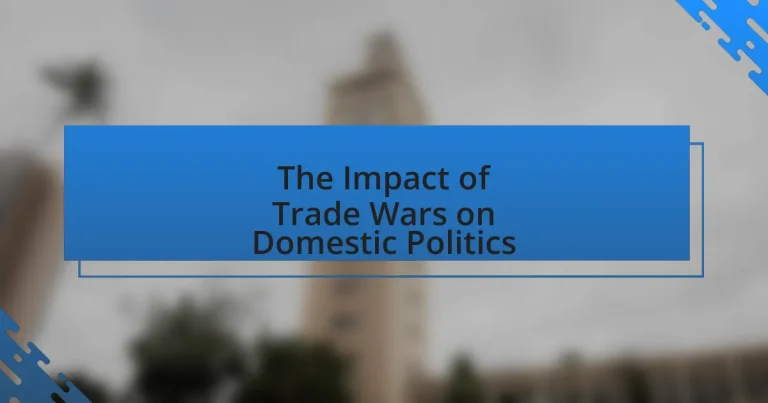Trade wars are economic conflicts characterized by the imposition of tariffs and trade barriers between countries, often stemming from trade imbalances and protectionist policies. This article examines the origins of trade wars, their initiation, and the economic and political factors that contribute to their escalation, with a focus on the U.S.-China trade war as a key example. It explores how trade wars influence domestic politics, public opinion, and electoral outcomes, as well as the long-term effects on political party dynamics and policy agendas. Additionally, the article discusses strategies for mitigating the impacts of trade wars and balancing trade interests with domestic needs.

What are Trade Wars and Their Origins?
Trade wars are economic conflicts that arise when countries impose tariffs or other trade barriers on each other to protect domestic industries. The origins of trade wars often stem from trade imbalances, protectionist policies, and nationalistic sentiments, which can lead to retaliatory measures. A notable example is the U.S.-China trade war that began in 2018, where the U.S. imposed tariffs on Chinese goods to address concerns over intellectual property theft and trade deficits, prompting China to retaliate with its own tariffs. This cycle of tariffs exemplifies how trade wars can escalate from initial grievances into broader economic confrontations, affecting global trade dynamics and domestic political landscapes.
How do trade wars begin?
Trade wars begin when countries impose tariffs or trade barriers on each other’s goods in response to perceived unfair trade practices. This often occurs after one nation believes another is engaging in practices such as dumping products at below-market prices, subsidizing domestic industries, or manipulating currency values. For instance, the U.S.-China trade war initiated in 2018 was triggered by the U.S. imposing tariffs on Chinese imports, citing unfair trade practices and intellectual property theft. This escalation led to retaliatory tariffs from China, exemplifying how initial actions can spiral into broader trade conflicts.
What economic factors contribute to the initiation of trade wars?
Economic factors that contribute to the initiation of trade wars include trade imbalances, protectionist policies, and domestic economic pressures. Trade imbalances occur when a country imports significantly more than it exports, leading to calls for tariffs to protect local industries. Protectionist policies, such as tariffs and quotas, are often implemented to shield domestic markets from foreign competition, which can escalate into trade wars. Additionally, domestic economic pressures, such as unemployment in key sectors or political lobbying from affected industries, can prompt governments to adopt aggressive trade measures. Historical examples include the U.S.-China trade war, where the U.S. aimed to address a substantial trade deficit and protect its manufacturing sector, leading to retaliatory tariffs from China.
How do political motivations influence the start of trade wars?
Political motivations significantly influence the start of trade wars by driving leaders to adopt protectionist measures to gain domestic support or distract from internal issues. For instance, leaders may impose tariffs to appeal to specific voter bases, such as industries that feel threatened by foreign competition, thereby solidifying their political power. Historical examples include the U.S.-China trade war initiated in 2018, where tariffs were used to address trade imbalances and protect American jobs, reflecting domestic political pressures. Additionally, political leaders may leverage trade wars to rally nationalistic sentiments, framing foreign nations as economic adversaries to unify public opinion and divert attention from domestic challenges.
What are the key characteristics of trade wars?
Trade wars are characterized by the imposition of tariffs and trade barriers between countries, leading to retaliatory measures. These conflicts often arise from disputes over trade imbalances, intellectual property rights, and market access. For instance, the U.S.-China trade war initiated in 2018 involved the U.S. imposing tariffs on Chinese goods, which prompted China to retaliate with its own tariffs, illustrating the cycle of escalation typical in trade wars. Additionally, trade wars can disrupt global supply chains, increase consumer prices, and create uncertainty in international markets, as evidenced by the significant fluctuations in stock markets during periods of heightened trade tensions.
What types of tariffs and trade barriers are commonly used?
Common types of tariffs include ad valorem tariffs, specific tariffs, and compound tariffs, while trade barriers often consist of quotas, import licenses, and non-tariff barriers such as standards and regulations. Ad valorem tariffs are calculated as a percentage of the value of the imported goods, specific tariffs are fixed fees based on quantity, and compound tariffs combine both methods. Quotas limit the quantity of goods that can be imported, while import licenses require permission to bring goods into a country. Non-tariff barriers can include health and safety regulations that restrict imports based on compliance with local standards. These measures are frequently employed by governments to protect domestic industries and influence trade dynamics.
How do trade wars affect international relations?
Trade wars significantly strain international relations by creating economic tensions and fostering distrust among nations. When countries impose tariffs or trade barriers, they disrupt established trade agreements and economic partnerships, leading to retaliatory measures that escalate conflicts. For instance, the U.S.-China trade war initiated in 2018 resulted in both nations imposing tariffs on billions of dollars’ worth of goods, which not only affected bilateral trade but also influenced global supply chains and international market stability. This deterioration in relations can hinder diplomatic negotiations and collaboration on other global issues, such as climate change and security, as countries become more focused on protecting their economic interests rather than fostering cooperative ties.

How do Trade Wars Influence Domestic Politics?
Trade wars significantly influence domestic politics by altering public opinion, impacting economic conditions, and reshaping political alliances. For instance, tariffs imposed during trade wars can lead to increased prices for consumers and reduced profits for domestic industries reliant on imported goods, which may prompt public discontent and pressure on political leaders. Historical examples include the U.S.-China trade war, where tariffs on Chinese goods led to backlash from American farmers and manufacturers, ultimately affecting electoral outcomes and policy decisions. Additionally, trade wars can exacerbate partisan divides, as political parties may leverage economic grievances to rally support or criticize opponents, thereby reshaping the political landscape.
What are the immediate political impacts of trade wars?
The immediate political impacts of trade wars include heightened tensions between nations, shifts in public opinion, and changes in domestic policy. Trade wars often lead to retaliatory tariffs, which can escalate conflicts and strain diplomatic relations, as seen in the U.S.-China trade war that began in 2018, where both countries imposed tariffs on billions of dollars’ worth of goods. This escalation can influence voter sentiment, as industries affected by tariffs may lobby for government intervention, prompting policymakers to adjust their strategies to maintain electoral support. Additionally, trade wars can lead to increased nationalism and protectionist sentiments, reshaping political discourse and party platforms, as evidenced by the rise of populist movements in various countries that capitalize on anti-globalization sentiments.
How do trade wars affect public opinion and voter sentiment?
Trade wars significantly influence public opinion and voter sentiment by creating economic uncertainty and altering perceptions of national leadership. When trade wars lead to job losses or increased prices for goods, public dissatisfaction often rises, prompting voters to reassess their support for incumbent politicians. For instance, a 2019 Pew Research Center survey indicated that 66% of Americans believed tariffs would hurt the economy, reflecting a negative sentiment towards trade policies. Additionally, trade wars can polarize opinions along partisan lines, with supporters of the ruling party often justifying the actions while opposition groups criticize them, further shaping voter attitudes and electoral outcomes.
What role do political parties play during trade wars?
Political parties play a crucial role during trade wars by shaping public opinion, influencing policy decisions, and mobilizing support or opposition to trade measures. They often align their positions with the interests of their constituents, which can lead to partisan divides on trade issues. For instance, during the U.S.-China trade war, the Republican Party largely supported tariffs as a means to protect American industries, while the Democratic Party expressed concerns about the negative impacts on consumers and global trade relations. This division illustrates how political parties can affect the direction and intensity of trade policies, as seen in the differing responses to tariffs and trade agreements.
How do trade wars reshape policy agendas?
Trade wars reshape policy agendas by forcing governments to prioritize domestic industries and employment over international trade relationships. This shift often leads to the implementation of protectionist measures, such as tariffs and subsidies, aimed at shielding local businesses from foreign competition. For instance, the U.S.-China trade war initiated in 2018 resulted in significant tariff increases on hundreds of billions of dollars’ worth of goods, prompting American policymakers to focus on revitalizing manufacturing and addressing job losses in affected sectors. Consequently, trade wars can catalyze legislative changes that emphasize economic nationalism, altering the political landscape and influencing future policy decisions.
What economic policies are influenced by trade wars?
Trade wars influence several economic policies, including tariffs, trade agreements, and domestic subsidies. Tariffs are often increased as a direct response to trade disputes, impacting import prices and domestic industries. For instance, the U.S.-China trade war initiated in 2018 saw the U.S. impose tariffs on over $360 billion worth of Chinese goods, which altered trade flows and domestic pricing structures. Additionally, trade agreements may be renegotiated or abandoned, as seen with the U.S. withdrawal from the Trans-Pacific Partnership, affecting international trade relations. Domestic subsidies may also be adjusted to support industries adversely affected by retaliatory tariffs, such as the agricultural sector, which received approximately $28 billion in aid during the trade tensions with China. These policies collectively reflect the broader economic strategies employed by governments in response to trade wars.
How do trade wars affect social policies and welfare programs?
Trade wars negatively impact social policies and welfare programs by straining government budgets and increasing economic uncertainty. When tariffs are imposed, domestic industries often face higher costs and reduced competitiveness, leading to job losses and decreased consumer spending. For instance, the U.S.-China trade war resulted in significant job losses in sectors like agriculture and manufacturing, which in turn pressured local governments to allocate more resources to unemployment benefits and social services. This shift in budget priorities can lead to cuts in existing welfare programs, as seen during the trade tensions when states reported increased demand for food assistance programs. Consequently, trade wars can exacerbate social inequalities and undermine the effectiveness of welfare initiatives.

What are the Long-term Effects of Trade Wars on Domestic Politics?
Long-term effects of trade wars on domestic politics include increased polarization, shifts in public opinion, and changes in political party dynamics. Trade wars often lead to economic disruptions, which can exacerbate divisions among the electorate, as seen in the U.S.-China trade conflict where rural areas dependent on agriculture faced significant challenges, influencing voter sentiment and loyalty. Additionally, trade wars can prompt political parties to realign their platforms, as evidenced by the Republican Party’s shift towards protectionist policies under recent administrations, reflecting a response to constituents’ concerns about job losses and economic stability. These dynamics can result in lasting changes in electoral strategies and policy priorities, shaping the political landscape for years to come.
How do trade wars impact electoral outcomes?
Trade wars significantly influence electoral outcomes by shaping public opinion and economic conditions. When trade wars lead to job losses or increased prices for consumers, voters often hold the ruling party accountable, which can result in electoral backlash. For instance, the U.S.-China trade war initiated in 2018 caused disruptions in various sectors, notably agriculture, leading to decreased support for incumbents in rural areas heavily affected by tariffs. According to a study by the National Bureau of Economic Research, regions that experienced greater economic distress due to trade policies saw a notable shift in voter preferences during the 2020 elections, favoring candidates who promised to address these economic challenges.
What historical examples illustrate the electoral consequences of trade wars?
The Smoot-Hawley Tariff Act of 1930 serves as a historical example illustrating the electoral consequences of trade wars. This legislation raised tariffs on numerous imports, leading to retaliatory tariffs from other countries and a significant decline in international trade. The economic fallout contributed to the Great Depression, which severely impacted the Democratic Party’s standing, resulting in a loss of congressional seats in the 1932 elections and the eventual defeat of President Herbert Hoover. Additionally, the trade policies during the U.S.-China trade tensions in the late 2010s affected electoral outcomes, as regions reliant on agriculture and manufacturing faced economic hardships, leading to shifts in voter support in the 2018 midterm elections. These examples demonstrate how trade wars can directly influence electoral results by affecting economic conditions and voter sentiment.
How do trade wars influence party platforms and ideologies?
Trade wars significantly influence party platforms and ideologies by reshaping economic priorities and voter sentiments. Political parties often adjust their platforms to align with public opinion, which can shift dramatically during trade conflicts. For instance, during the U.S.-China trade war, the Republican Party emphasized nationalism and protectionism, appealing to voters concerned about job losses in manufacturing sectors. Conversely, the Democratic Party began to incorporate more progressive trade policies, advocating for fair trade practices that protect workers’ rights. This shift reflects a broader ideological realignment where parties respond to the economic anxieties of their constituents, as evidenced by polling data showing increased support for protectionist measures among voters during trade disputes.
What strategies can governments adopt to mitigate the effects of trade wars?
Governments can adopt several strategies to mitigate the effects of trade wars, including diversifying trade partnerships, implementing domestic support programs, and enhancing diplomatic negotiations. Diversifying trade partnerships allows countries to reduce reliance on specific markets, thereby minimizing the impact of tariffs and trade barriers imposed by adversarial nations. For instance, countries like Canada have sought new trade agreements with nations in Asia and Europe to offset losses from U.S. tariffs.
Implementing domestic support programs, such as subsidies or financial assistance for affected industries, can help stabilize local economies and protect jobs. The U.S. government, for example, allocated billions in aid to farmers impacted by retaliatory tariffs during the trade conflict with China.
Enhancing diplomatic negotiations can also play a crucial role in resolving trade disputes and fostering cooperation. Engaging in multilateral discussions through organizations like the World Trade Organization can lead to more sustainable trade agreements that benefit all parties involved. These strategies collectively help governments cushion the adverse effects of trade wars on their economies and political landscapes.
How can policymakers balance trade interests with domestic needs?
Policymakers can balance trade interests with domestic needs by implementing targeted trade policies that protect local industries while promoting international trade. For instance, they can impose tariffs on imported goods that compete with domestic products, thereby supporting local manufacturers and preserving jobs. According to the U.S. International Trade Commission, tariffs on steel and aluminum imports in 2018 aimed to protect American jobs and industries, demonstrating a direct approach to balancing these interests. Additionally, policymakers can invest in workforce development and retraining programs to help workers transition from declining industries to sectors that benefit from trade, ensuring that domestic needs are met without sacrificing trade relationships.
What best practices can be implemented to navigate trade conflicts?
To navigate trade conflicts effectively, stakeholders should prioritize open communication and negotiation. Establishing clear channels for dialogue allows parties to express concerns and seek mutually beneficial solutions, reducing misunderstandings that can escalate tensions. Historical examples, such as the 1993 North American Free Trade Agreement negotiations, demonstrate that transparent discussions can lead to compromises that satisfy multiple interests. Additionally, employing conflict resolution frameworks, such as mediation or arbitration, can provide structured approaches to resolving disputes without resorting to punitive measures. These practices not only foster cooperation but also contribute to long-term stability in trade relationships.





